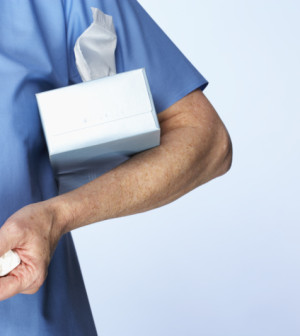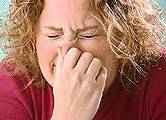- Could Your Grocery Store Meat Be Causing Recurring UTIs?
- Are You Making This Expensive Thermostat Error This Winter?
- Recognizing the Signs of Hypothyroidism
- 10 Strategies to Overcome Insomnia
- Could Artificial Sweeteners Be Aging the Brain Faster?
- Techniques for Soothing Your Nervous System
- Does the Water in Your House Smell Funny? Here’s Why
- Can a Daily Dose of Apple Cider Vinegar Actually Aid Weight Loss?
- 6 Health Beverages That Can Actually Spike Your Blood Sugar
- Treatment Options for Social Anxiety Disorder
Tips for Managing Spring Allergies


Spring officially arrived on Friday, bringing with it Spring allergies that cause misery for millions of Americans. But there are ways folks can get relief, a medical expert says.
“The key to surviving spring allergies is knowing what triggers your symptoms,” Dr. James Sublett, president of the American College of Allergy, Asthma and Immunology, said in a college news release.
“Because there can be millions of pollen particles in the air, finding allergy relief can seem nearly impossible for some. But by knowing what triggers your allergy symptoms and how to avoid these allergens, you can be on your way to a sneeze-free season,” he said.
The college offers some tips for dealing with spring allergies:
- Avoid clothing made of synthetic fabrics, which, when rubbed together, can create an electrical charge that attracts pollen. Opt for natural fibers such as cotton, which also breathe better and stay drier, making them less likely to harbor mold.
- Exercise outdoors when pollen counts are at their lowest — before dawn and in the late afternoon and early evening. Because exercise causes you to breathe more deeply and inhale more pollen, try to do vigorous workouts indoors. If you’re going out for an easy walk, take a nondrowsy antihistamine before you go.
- If you garden, take an antihistamine about a half hour before you go outside. Digging up dirt can stir up pollen, so you should wear gloves and a National Institute for Occupational Safety and Health (NIOSH)-rated 95 filter mask. Try not to touch your eyes. When you go back inside, wash your hands, hair and clothes.
- Limit your exposure to indoor allergens to help reduce the severity of your spring allergies. Vacuum your furniture, leave your shoes by the door, shower often, cover floors with washable throw rugs, and use a dehumidifier and an air purifier with a HEPA filter.
- If your allergy medications don’t provide sufficient relief, consider allergy shots.
More information
The U.S. National Institutes of Health has more about seasonal allergies.
Source: HealthDay
Copyright © 2026 HealthDay. All rights reserved.










